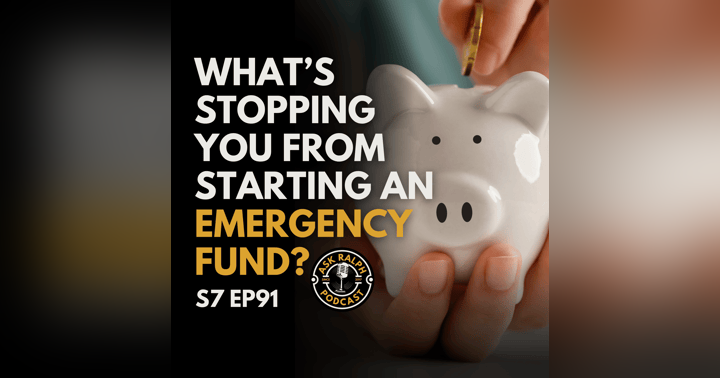Which 10 Expenses Should You Eliminate to Slash Your Budget?

What Are 10 Expenses I Can Drop Immediately And Not Even Miss Them?
Feeling like your money is slipping right through your fingers can be incredibly frustrating. It's easy to feel out of control when expenses seem to pile up and savings dwindle. Join Ralph Estep Jr. on the Ask Ralph Show as he discusses how to save money by identifying and cutting out 10 unnecessary expenses. Highlighting examples like daily coffee shop visits and unused subscriptions, Ralph provides practical tips that can save listeners thousands of dollars annually. The episode also opens with a question from a listener named Sheila, exploring the fear of feeling deprived when cutting expenses. Throughout, Ralph integrates a Christian perspective, including insights from the Bible, to encourage financial stewardship. Additionally, Ralph shares actionable steps to help listeners review and Eliminate to Slash Your Budget with their values and long-term goals.
Watch Now on Rumble
Introduction
Ralph begins the episode by addressing the common issue of unnoticed expenses that drain our budgets. He draws listeners in with a vivid example of overspending on coffee compared to grocery costs. Ralph promises to reveal ten expenses that can be cut without being missed, aiming to help listeners take control of their finances. He expresses enthusiasm for sharing practical money-saving ideas that can be implemented immediately.
Listener's Question
Sheila, a listener from South Dakota, writes in with a heartfelt message about her financial struggles. Despite having a decent job, Sheila feels perpetually broke and is worried about feeling deprived if she cuts back on spending. She asks Ralph for suggestions on expenses she can cut without missing them. Ralph acknowledges the relevance of her question to the day's topic and appreciates her and other listeners' engagement.
Bible Verse
Ralph shares a passage from Luke 16:10, which emphasizes the importance of being trustworthy with small amounts to be trusted with more significant sums. He relates this biblical wisdom to financial management, highlighting how small spending habits shape our overall financial character. Ralph uses this scripture to remind listeners that faithful handling of minor financial matters is crucial.
The Latte Factor
The first expense Ralph discusses is the daily habit of buying coffee. He breaks down the costs, showing how a $5 daily coffee can add up to $1,200 annually. Ralph suggests investing in a good coffee maker and quality beans as a cost-effective alternative. He shares his personal preference, humorously noting that he doesn't like coffee.
Unused Subscriptions
Ralph addresses the common issue of unused subscriptions, particularly streaming services. He advises listeners to evaluate their subscriptions and cut down to the top two or three, potentially saving $30 to $50 a month. Ralph shares a personal discovery about free streaming services through his Verizon account, encouraging listeners to check their options.
Switching to Generic Brands
Ralph suggests switching to generic or store-brand products for medications, cleaning supplies, and groceries. He explains that these products often offer the same quality as name brands at a lower cost, potentially saving 20-30%. Using an example of a $500 monthly expenditure on these items, Ralph illustrates how the savings can add up to $1,200 to $1,800 annually.
Eating Out Less
Ralph discusses the financial impact of frequently eating out or ordering in. He points out that reducing restaurant visits to once a week can save up to $100 weekly, amounting to $5,200 annually. Ralph also mentions the high costs of online delivery services like DoorDash and GrubHub. He emphasizes the value of home-cooked meals and suggests that cutting back on eating out can lead to significant savings.
Impulse Purchases
Ralph tackles the issue of impulse purchases, such as items bought at checkout lines or added to online orders. He advises listeners to cut these unnecessary expenses, which can add up to $50 to $100 a month. Eliminating impulse buys could save $600 to $1,200 annually. Ralph reminds listeners that these purchases are designed to tempt and encourages mindful spending.
Unused Gym Memberships
Ralph addresses the expense of unused gym memberships, suggesting canceling them if not used regularly. He notes that the average gym membership costs around $50 a month, or $600 annually. Ralph proposes free alternatives like YouTube workout videos or neighborhood runs.
Cutting the Cord on Cable TV
Ralph suggests that with numerous streaming options available, cable TV may no longer be necessary. Cutting cable could save $50 to $100 a month, amounting to $600 to $1,200 annually. He reflects on the growing obsolescence of cable TV and the availability of cheaper alternatives.
High-Interest Credit Card Debt
Ralph discusses the burden of high-interest credit card debt and advises listeners to pay it off quickly. He explains that only making minimum payments results in wasting money on interest. Ralph shares that eliminating $100 a month in interest could save $1,200 annually.
Bottled Water Costs
Ralph highlights the environmental and financial downsides of buying bottled water. He suggests investing in a good water filter and a reusable bottle, estimating potential savings of $260 annually. Ralph also mentions the health benefits of drinking more water.
Reducing Energy Waste
Ralph advises on simple ways to reduce energy waste, such as turning off lights, unplugging appliances, and adjusting the thermostat. He estimates savings of $20 to $30 a month, or $240 to $360 annually. Ralph reminisces about energy-saving campaigns from his childhood, suggesting a revisit of these practices.
Cumulative Savings and Practical Tips
Ralph sums up the potential savings from implementing all the suggested changes, ranging from $11,860 to $14,120 annually. He reassures listeners that most of these expenses are habitual rather than necessary. Ralph offers examples of cost-effective alternatives, such as homemade coffee and movie nights with friends. He encourages intentional spending aligned with values and long-term goals.
Actionable Steps and Conclusion
Ralph provides a step-by-step plan for listeners to implement the discussed changes. He suggests reviewing bank and credit card statements, listing expenses, and choosing three to five to eliminate or reduce. Ralph advises identifying cost-effective alternatives and tracking savings. Celebrating successes and gradually addressing other expenses are part of the plan. Ralph concludes by emphasizing the importance of being in control of money and aligning spending with values and goals.
Join our email list and get a free copy of “Mastering Your Finances” at https://askralph.com/










